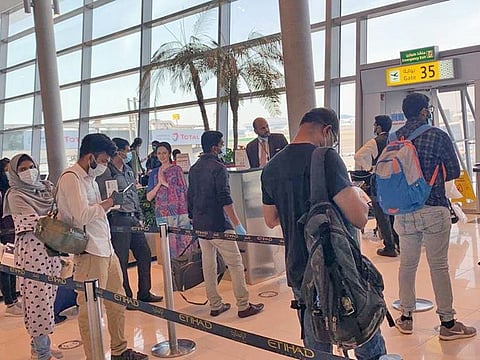UAE-India travel: After Emirates, Go First announces more flights on the route
Emirates was the first to boost capacity after India resumed international flights

Dubai: Go First, formerly known as Go Air, will be operating more flights between Abu Dhabi and three Indian destinations.
The airline will be flying daily to Mumbai, Kannur, and Delhi in response to an “increased demand for these routes”, said Abu Dhabi Airports in a statement on Monday.
The announcement, part of the airport’s summer schedule, comes after the Indian government restored international flights to and from the country in line with established bilateral agreements. Abu Dhabi has also made PCR testing optional for travelers flying into the emirate.
Following India’s resumption of international operations, Emirates airline was the first to boost capacity on the route. The airline said it would operate 170 weekly flights to nine cities in the country, starting from April 1. Emirates has also brought back its daily A380 service on the Dubai-Mumbai route.
A look at fares
Go First is currently charging around Dh600 for a one-way ticket from Abu Dhabi to Delhi. Travelling to Kannur, located in the South Indian state of Kerala, costs around Dh370; Mumbai costs around the same.
Etihad Airways, Abu Dhabi’s flagship carrier, is seen charging around Dh450 for Mumbai and more than Dh900 for Delhi.
No more PCR tests
Last week, Air India Express announced that India has scrapped PCR testing for fully vaccinated passengers from UAE.
In a letter issued to travel agents, the carrier said that guests who have completed the full vaccination schedule of both doses from a list of recognised countries on ‘reciprocity’ basis are exempted from RT-PCR testing prior to departure for travel to India from UAE.
Travel agents said fewer restrictions will encourage more passengers to travel as thousands of visitors head back after the months-long Expo 2020 event.
Back to normal
Prior to COVID-19, India-UAE was among the busiest air routes in the world with Dubai representing a large portion of India’s international traffic. India’s second wave, which was caused by the ‘delta’ variant, prompted UAE and several countries to place a months-long ban on flights from the country.
India’s ‘bubble’ agreement regime also placed limits on airlines’ international flight capacity and added an extra layer of bureaucracy to routine operations.
Sign up for the Daily Briefing
Get the latest news and updates straight to your inbox


